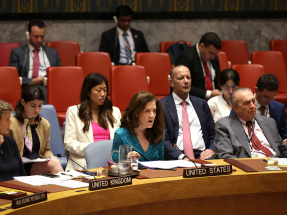Iran officially suspended its cooperation with the UN nuclear watchdog on Wednesday, a move the United States described as "unacceptable".
It came after last month's 12-day conflict between Iran and Israel, which saw unprecedented Israeli and US strikes on Iran's nuclear facilities and sharply escalated tensions between Tehran and the International Atomic Energy Agency (IAEA).
On June 25, a day after a ceasefire took hold, Iranian lawmakers voted overwhelmingly to suspend cooperation with the Vienna-based IAEA. State media confirmed on Wednesday that the legislation had now taken effect.
The law aims to "ensure full support for the inherent rights of the Islamic Republic of Iran" under the nuclear Non-Proliferation Treaty, with a particular focus on uranium enrichment, according to Iranian media.
Washington, which has been pressing Tehran to resume the negotiations that were interrupted by Israel's resort to military action on June 13, hit out at the Iranian decision.
"We'll use the word unacceptable, that Iran chose to suspend cooperation with the IAEA at a time when it has a window of opportunity to reverse course and choose a path of peace and prosperity," State Department spokeswoman Tammy Bruce said.
The spokesman for UN chief Antonio Guterres said the decision was "obviously concerning".
Separately, the Pentagon said on Wednesday that US intelligence assessments indicated that the strikes on Iran's nuclear sites set the country's atomic programme back by up to two years.
"We have degraded their programme by one to two years at least – intel assessments inside the (Defense) Department assess that," Pentagon spokesman Sean Parnell told journalists, later adding: "We're thinking probably closer to two years."
While IAEA inspectors have had access to Iran's declared nuclear sites, their current status is uncertain amid the suspension.
On Sunday, Iran's ambassador to the United Nations, Amir Saeid Iravani, said the inspectors' work had been suspended but denied there had been any threats against them or IAEA chief Rafael Grossi.
He said that the "inspectors are in Iran and are safe", but "their activities have been suspended, and they are not allowed to access our sites".
The new legislation did not specify any exact steps following the suspension.
The ISNA news agency cited lawmaker Alireza Salimi as saying that the inspectors now needed approval from Iran's Supreme National Security Council to access nuclear sites. (AFP)
- Home
2025-07-02 HKT 07:22
2025-06-29 HKT 18:39
2025-06-29 HKT 07:45
2025-06-28 HKT 22:03
2025-06-28 HKT 10:08
2025-06-28 HKT 06:34
2025-06-27 HKT 07:11
2025-06-26 HKT 21:21
2025-06-26 HKT 12:55
2025-06-26 HKT 07:34
2025-06-26 HKT 07:15
2025-06-25 HKT 19:20
2025-06-25 HKT 08:28
2025-06-24 HKT 19:06
2025-06-24 HKT 14:07
2025-06-24 HKT 13:24





















